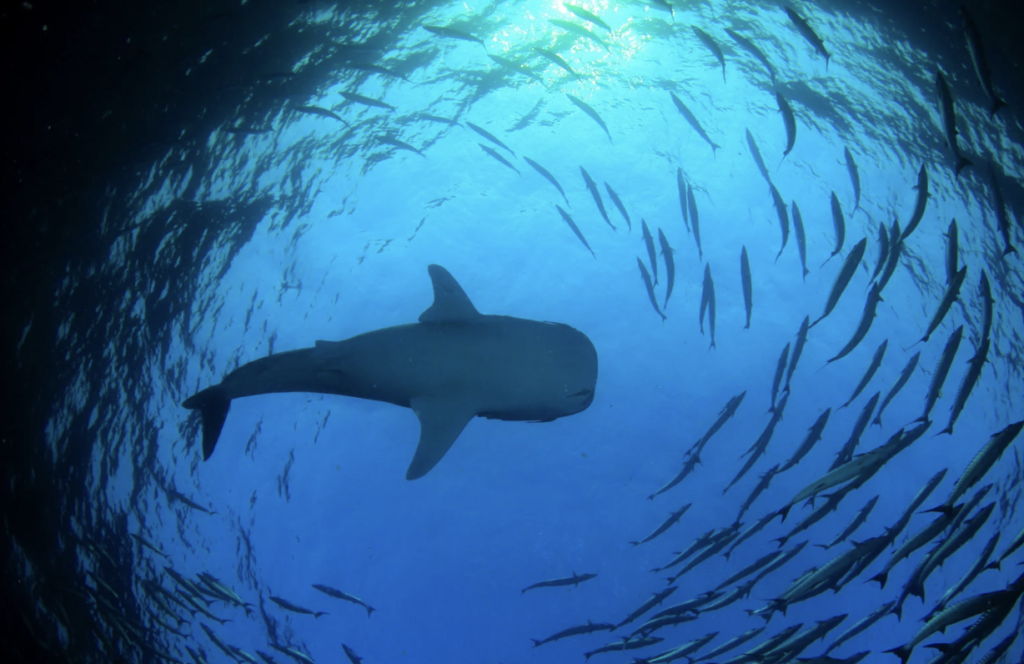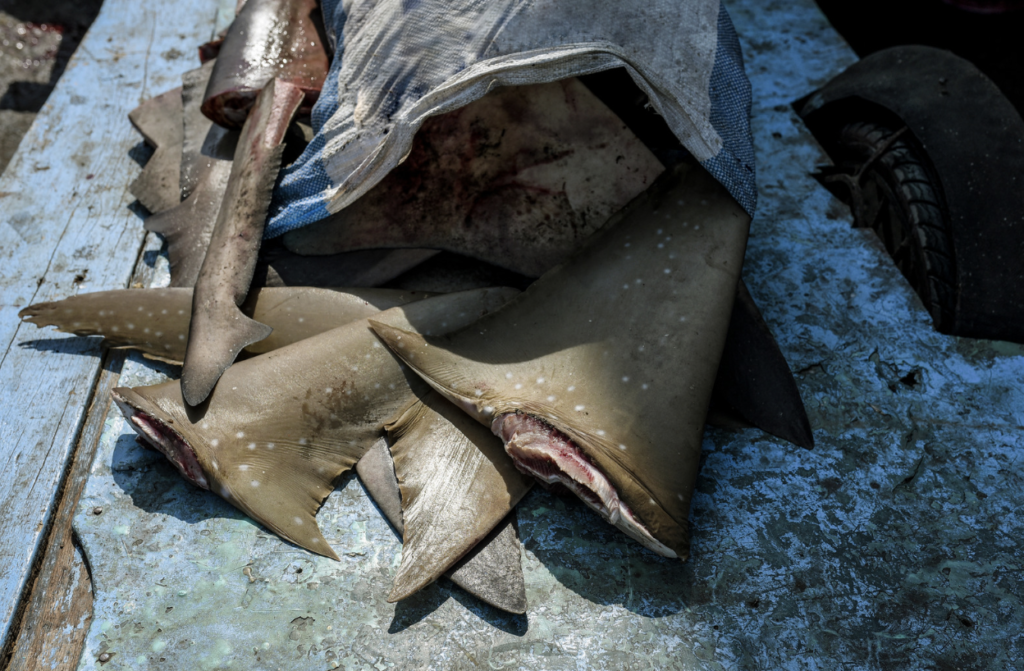This summer is the 50th anniversary of one of the top-10 grossing films of all time: Jaws, the Steven Spielberg-directed movie in which a great white shark terrorizes a beach town. There will be festivities on Martha’s Vineyard, where the film was shot, lots of press coverage, and several symphonies even plan to perform the film’s iconic score. Lost in the celebration is the hard reality of shark overfishing. Over one-third of the world’s shark and ray species are now facing possible extinction. That’s right – 86 million or more sharks are killed globally each year.
Seeing sharks as victims rather than villains may seem strange to the millions of people who have watched Jaws and other films that depict them as bloodthirsty, vengeful monsters. Today no other animal, in land or water, generates the kind of entertainment value that sharks do. Blockbuster movies about diabolical sharks continue to be made, and “Shark Week” is still going strong after 35 years on the Discovery Channel. That show, the longest-running cable television series in history, has finally moved away from focusing on sharks as human predators but is still full of misleading information about sharks. In reality, people have a 1 in 4 million chance of dying by shark attack. People are far more likely to die of accidental poisoning, car crashes, or even being struck by lightning.
All these stories about villainous sharks hide the fact that it is actually humans who are the threat. Sharks may be an apex predator of the ocean, but they are no match for industrial-scale fishing fleets. Oceanic shark and ray populations have declined by 71% since 1970 due to an 18-fold increase in fishing pressure. As a result, three-quarters of the species are now threatened with extinction. Compare that to the 1980s, when only one species, the plankton-feeding basking shark, was considered endangered.
Despite their bad reputation, sharks are a crucial component of marine life. Sharks help maintain a healthy oceanic ecosystem by weeding out the sick, weak and dying and ensuring that only the fittest survive. As a top marine predator, they keep the food chain in check: without sharks, other specie populations would become so bloated that the animals they feed on would be wiped out. A balanced ocean food chain in turn provides food and jobs for humans around the world.
What is Shark Overfishing?
Overfishing is so pervasive today that it directly impacts 100% of endangered sharks, and is the only threat for 67% of all shark and ray species. The remaining third of shark species have to contend not only with overfishing, but also loss of habitat, climate change, and pollution.
Shark overfishing happens when sharks are killed so quickly, and in such great numbers, that they are unable to reproduce in time to restore their populations. This is caused by the development over the last century of new fishing methods like long-lines, trawling, and gill nets. Long-lines are especially lethal for sharks: researchers have shown that longlines have doubled the fishing pressure on sharks. Lines of up to 1,200 baited hooks stretching more than 100 km lines are trailed through mid and bottom level ocean waters behind thousands of commercial fishing vessels on a daily basis, snaring sharks either intentionally or as bycatch when targeting other fish.
Sharks as a species are especially vulnerable to overfishing because it takes them so long to produce offspring. Sharks have longer pregnancies, averaging between 9-12 months, and some species don’t reproduce every year. Sharks don’t reproduce as fast as fish that lay eggs, and some just have 2 pups at a time. Additionally, sharks mature slowly. An extreme is the Greenland Shark which can live as long as 400 years and doesn’t reach sexual maturity until about 150 years old! Sadly many are killed before they are able to reproduce.
What is Driving Shark Overfishing?

Many sharks are caught by accident – but when they are, fisheries keep them to sell their bodies as meat. The few that are returned to the water die of their injuries. When targeted, sharks are caught for these reasons:
- Shark Fins: Shark fins are harvested for shark fin soup, a delicacy which is commonly consumed in East and Southeast Asian countries, although China and Hong Kong have banned the soup at government events. The soup is also illegally sold in other countries like the United States where shark finning is banned.
- Shark Meat: Global trade in shark meat has increased in recent years and now exceeds the demand for fins. Shark meat is an increasingly popular in the USA, Europe, Japan and Australia.
- Shark Liver Oil: This is labelled squalene or squalane, and is found in a surprising number of products. It can be found in cosmetics like moisturizers, deodorants, sun tan lotion, and lip balm. It’s also used in vaccines, pills and supplements. Deep-sea sharks are fished so intensively for this product that many are now listed as endangered.
- Shark Leather: Shark skin is used to make luxury items like wallets, shoes, handbags, jackets and even furniture. It is especially popular in the U.S., northern Europe and Japan. Shark leather is prized because it is especially durable.
- Shark Cartilage: Sold as a health supplement, shark cartilage is believed to help with arthritis, shingles, rheumatism, cancer and many other conditions.
- Shark Teeth and Jaws: A single tooth can sell for over $100 and a whole set of jaws can bring in up to $10,000. White Sharks are protected under international law, but illegal smuggling of their teeth is becoming increasingly common.
Shark Finning: A Gruesome Practice

Shark finning is one of the leading contributors to shark overfishing. Shark finning occurs when people catch sharks, slice their fins off, and then then throw them back in the ocean to die a slow death. According to some estimates, as much as 80% of intentionally killed sharks are targeted for this reason.
Shark finning is such a wasteful and cruel practice that it has become a major cause in the prevention of overfishing. Thanks to all this attention, shark finning is now outlawed in many countries. In addition, global fisheries management organizations have banned shark finning in their tuna and longline fleets. In November 2023 the Convention on International Trade in Endangered Species of Wild Fauna and Flora (CITES) in Panama City in 2022 approved a proposal to protect the Requiem family of sharks, which account for more than 50% of the trade in shark fins. Seventy percent of the family already risks extinction.
Despite this progress, shark finning is still a major threat to sharks: Small boats and nations who do not recognize global treaties continue to practice shark finning with impunity, and there is evidence that fins from protected sharks continue to be illegally sold.
Shark Populations Continue to Decline Despite Regulations
With more bans against shark finning in place now than ever, we might expect shark mortality rates to drop. But unfortunately, the opposite is true: even more sharks are being culled from the ocean than before, according to a recent study in Science magazine. Over a 7-year period during which shark finning regulations were implemented, shark fishing deaths jumped from 76 to 80 million sharks per year. About a third of the sharks killed were threatened species.
Why is this happening? The study found that it might be an unintended consequence of the bans themselves. While the crackdown reduced shark finning rates, it very likely motivated fisheries to simply find ways to use the whole shark.
This has increased the sale and consumption of shark meat, oil and other products in countries that did not previously have a large market for these shark products. For example, Brazil was one of the first countries to ban shark finning. After the regulations were put in place, demand for shark meat jumped up. Most Brazilians do not know they are eating shark, as it is labelled under a different name.
Shark meat has become valued for its unique taste and high nutritional value, and the global shark meat market is estimated to grow by $141 million from 2024-2028, according to recent market estimates. In fact, the global market for shark meat is now bigger than the fin market: in 2021, shark meat trade was valued at $2.6 billion for the year, as opposed to the $1.5 billion value of the shark fin market.
Protecting Sharks from Overfishing
Shark conservationists are calling for increased regulations on coastal fisheries. A startling 95% of shark deaths occur in national waters. Shark killings have increased in coastal fisheries by 4%, driven by hotspots like Indonesia, Brazil and Mexico. What conservationists would like to see happen: science-based limits on fishing, effective management of protected areas, and approaches to fisheries management that limit or stop the killing of threatened species while making sure that others are sustainably caught.
Unfortunately it’s hard to enforce these types of regulations. Many existing rules are not strong enough, are easily evaded in individual countries. Any kind of strengthening of the regulations must take into account that over half of the fisheries are based in developing countries. Cutting back or eliminating the work of these fisheries, if not done carefully, would devastate these communities. On top of that: illegal, unreported and unregulated (IUU) fishing is alive and well, and may account for as much as 30% of the total catch of all high-value species.
The good news is that strict governmental enforcement within nations has been proven effective in reducing shark mortality in countries like the Bahamas and the Maldives, according the Science study. Conservationists hope this can be a model for other countries. Also cause to celebrate: shark killings in open-ocean fisheries across the Atlantic and western Pacific actually decreased by 7% over the 7-year length of the study. Regional tuna fisheries made a big impact here by carefully managing new regulatory measures.
What You Can Do

How can you help fight against shark overfishing? Here are some places to start:
- Refuse to eat shark, and know the ways it can be mislabeled. In the U.S., fish products with the following names might actually be shark: huss, rock salmon, flake, dogfish, grayfish and whitefish. Some imitation crab is made with shark meat, as well as fish and chips.
- If you do choose to eat shark, make sure you know where it is coming from. Sustainable fish should be able to be traced from boat to counter. Look for information on the packaging that tells you where it was sourced.
- Do not buy shark teeth souvenirs
- Avoid non-edible products that are made from sharks, such as cosmetics that contain squalene.
- Continue to educate yourself about shark overfishing and how to protect them.
- Check out the following SAFE Worldwide pages for more tips about ocean conservation:
- https://safeworldwide.org/ethical-tourism-3/
- https://safeworldwide.org/educate-yourself-2/
REFERENCES
Dulvy, N. K., Pacoureau, N., Rigby, C. L., Pollom, R. A., Jabado, R. W., Ebert, D. A., … & Carlson, J. K. (2021). Oceanic sharks and rays have declined by 71% since 1970 – A global solution is needed. The Conversation. https://theconversation.com/oceanic-sharks-and-rays-have-declined-by-71-since-1970-a-global-solution-is-needed-154102
Marquez, M. C. (2024, January 19). Unraveling the impact of finning bans on global shark populations. Forbes. https://www.forbes.com/sites/melissacristinamarquez/2024/01/19/unraveling-the-impact-of-finning-bans-on-global-shark-populations/
Pacoureau, N., Rigby, C. L., Kyne, P. M., Sherley, R. B., Winker, H., Carlson, J. K., … & Dulvy, N. K. (2021). Half a century of global decline in oceanic sharks and rays. Nature, 589(7843), 567-571. https://doi.org/10.1038/s41586-020-03173-9
Plumer, B. (2024, January 11). Shark fins and overfishing. The New York Times. https://www.nytimes.com/2024/01/11/climate/shark-fins-overfishing.html
Marine Stewardship Council. (n.d.). Sharks. https://www.msc.org/species/sharks
Save Our Seas Foundation. (n.d.). Threats: Overfishing. https://saveourseas.com/worldofsharks/threats/overfishing
Shark Stewards. (n.d.). Shark finning facts. https://sharkstewards.org/shark-finning/shark-finning-fin-facts/
Shark Trust. (n.d.). Shark threats. https://www.sharktrust.org/shark-threats
Verhoeven, J. T. P., & Bertness, M. D. (2024). The impact of climate change on coastal ecosystems. Science, 375(6586), 12-20. https://doi.org/10.1126/science.adf8984


